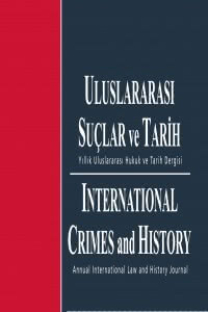LUMUMBA'NIN ÖLÜMÜ: ULUSLARARASI SİLAHLI ÇATIŞMADA BİR SAVAŞ SUÇU MU?
Uluslararasılaşma, Lumumba, savaş suçu
LUMUMBA’S DEATH, A WAR CRIME IN AN INTERNATIONAL ARMED CONFLICT?
___
- Y. Arai-Takahashi, Disentangling Legal Quagmires: The Legal Characterisation of the Armed Conflicts in Afghanistan since 6/7 October 2001 and the Question of Prisoner of War Status, 5 Yearbook of International Humanitarian Law, 2002, 61-105
- R. Bierzanek, Quelques remarques sur l’applicabilité du droit international humanitaire des conflits armés aux conflits internes internationalisés in C. Swinarski, En l’honneur de Jean Pictet: Etudes et essais sur le droit international humanitaire et sur les principes de la Croix Rouge, The Hague, ICRC, 1984
- C. Braeckman, L’assassinat de Lumumba s’invite à la fête, Le Soir, 23 juin 2010, http://archives.lesoir.be/l-assassinat-de-lumumba-s-invite-a-la- fete_t-20100623-00YRML.html?query=lumumba&queryor=lumumba& firstHit=10&by=10&when=-1&sort=datedesc&pos=16&all=562&nav =1
- A. Cassese, The Nicaragua and Tadic Tests Revisited in Light of the ICJ Judgment on Genocide in Bosnia, 18 EJIL 2007, 649-668
- A. Cassese, International Criminal Law, Oxford, OUP, 2008
- E. Clinton, The United Nations and the Congo 47 A.B.A.J. , 1961, 1079- 1083
- Commission Lumumba (Belgium), Les secrets de l’affaire Lumumba, Bruxelles, Racine, 2005
- A. Cullen, Key Developments Affecting the Scope of Internal Armed Conflict in International Humanitarian Law, 183 Military L. Rev., 2005, 66-109
- E. David, Principes de droit des conflits armés, Bruxelles, Bruylant, 2008
- L. de Witte, The Assassination of Lumumba, London, Verso, 2002
- D. Fleck, Shortcomings of the grave breaches regime, J. Int’l Criminal Justice, 2009, 833-854
- J. Gérard-Libois, Congo 1960, Bruxelles, CRISP, 1960
- C. Hoskyns, The Congo since Independence: January 1960 – December 1961, London, OUP, 1965
- E. LaHaye, War Crimes in Internal Armed Conflicts, Cambridge, CUP, 2008
- D. McNemar, The Postindependence War in the Congo, in Quincy Wright, The International Law of Civil War, Baltimore, John Hopkins Press, 1971, 244-302
- H. Meyrowitz, Le droit de la guerre dans le conflit vietnamien, AFDI, 1967, 153-201
- J. Pictet, Commentary on the Geneva Conventions of 12 August 1949 (1952)
- W. A. Schabas, Punishment of non-state actors in non-international armed conflict, 26 Fordham Int’l L. J., 2002-2003, 907-933
- J. G. Stewart, Towards a single definition of armed conflict in international humanitarian law: a critique of internationalized armed conflict, 85 Int’l Rev. of the Red Cross, 2003, 313-348
- B. Verhaegen, Congo 1961, Bruxelles, CRISP, 1961
- Onze mois de crise politique au Congo, Courrier Hebdomadaire, 1961
- Evolution de la crise congolaise, Chronique de politique étrangère, 1961
- L’ONU et le Congo, Chronique de politique étrangère, 1962
- Nicaragua Case ICJ (27 June 1986)
- Tadic Case (Decision Appeals Chamber) ICTY (2 October 1995)
- Kunarac Case, (Decision Appeals Chamber) ICTY (12 June 2002)
- Dario Kordic and Lario Cerkez Case, (Decision Appeals Chamber) ICTY (17 December 2004)
- Naletilic Case (Decision Appeals Chamber) ICTY (3 May 2006)
- Genocide Case ICJ (18 November 2008)
- SC Resolution 143 of 14 July 1960 (S/4387)
- SC Resolution 145 of 22 July 1960 (S/4405)
- SC Resolution 146 of 9 August 1960 (S/4426)
- SC Resolution 161 of 21 February 1961 (S/4741)
- ISSN: 1306-9136
- Yayın Aralığı: 1
- Başlangıç: 2006
- Yayıncı: Terazi Yayıncılık Basım Dağıtım Danışmanlık Eğitim Organizasyon Matbaacılık Kırtasiye Tic. Ltd. Şti.
LUMUMBA'NIN ÖLÜMÜ: ULUSLARARASI SİLAHLI ÇATIŞMADA BİR SAVAŞ SUÇU MU?
YUNANİSTAN’IN BAĞIMSIZLIĞI SÜRECİNDE YOK EDİLEN MORA TÜRKLERİ
ULUSLARARASI SUÇLAR VE TARİH DERGİSİ MAKALE ÇAĞRISI
BALKANLAR’DA TERÖRİZM TEHDİDİ: GERÇEK Mİ, HAYAL Mİ?
PONTUS MESELESİ: GENEL BİR BAKIŞ
Mustafa Serdar PALABIYIK, Yıldız Deveci BOZKUŞ
